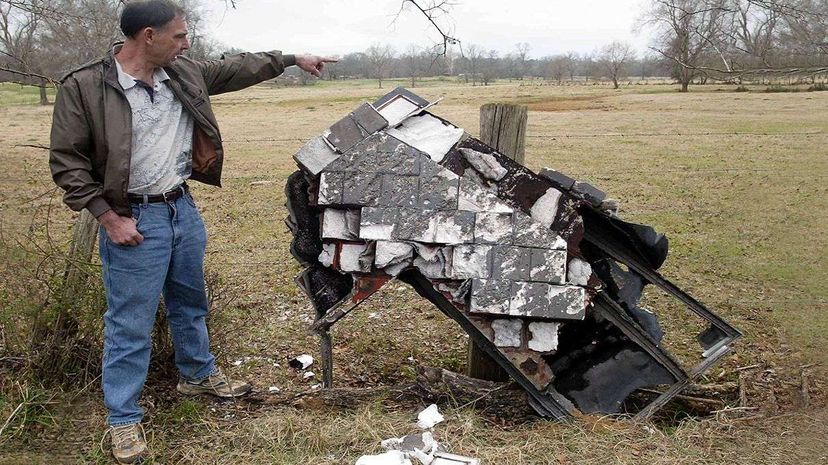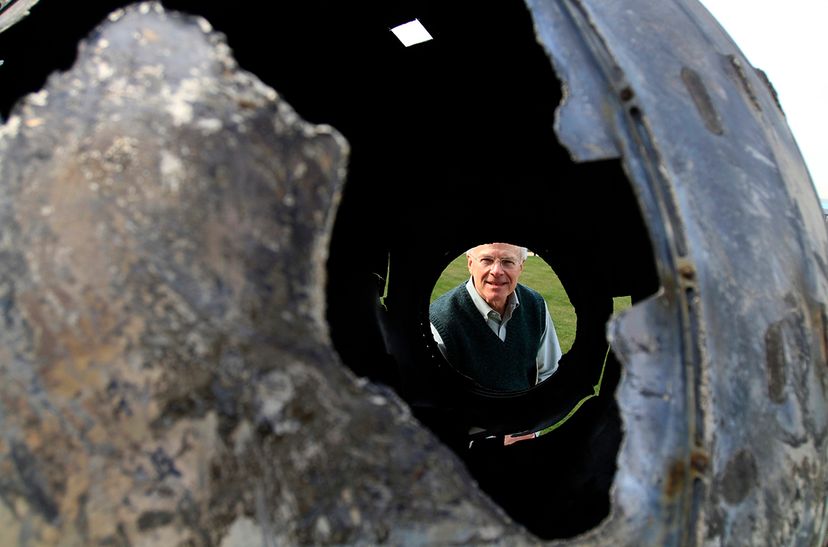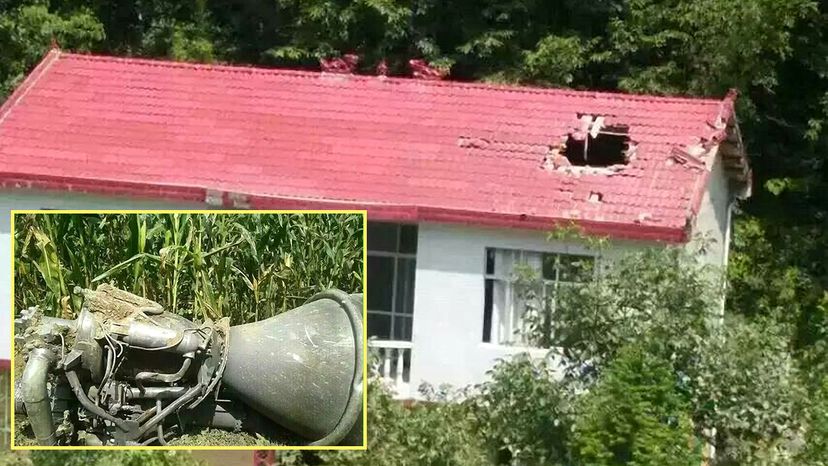
If you think you had a bad day because one of the neighborhood kids hit a baseball through your front window, consider the predicament of a homeowner in Fuquan, China. On August 27, a rocket took off from the Shanxi province's Taiyuan Space Launch Center to put a satellite into orbit. A few hours later, what appears to be a nozzle from the rocket's first stage crashed through the person's roof. The website SinoDefence tweeted these photos of the damage caused by the man-sized piece of debris.
Getting hit by rocket parts might sound like a pretty bizarre mishap. But in China, there are numerous news reports of such accidents. “Taiyuan, or Wuzhai as US intelligence calls it, is in a remote but not uninhabited area, and nearby homes are just part of the risk,” says Tim Brown, a satellite intelligence analyst for the Virginia-based think tank Globalsecurity.org.
Advertisement
This past January, a rocket malfunctioned and crashed, scattering pieces along a road outside the same town, though fortunately they missed the houses that time. In December 2013, after China's first moon rover was launched from Xichang Satellite Launch Center in Sichuan province, pieces of the discarded rocket booster landed in a village in the neighboring Human province, smashing through the roofs of buildings.
Yang Wei Fang Han, who was home when a piece crashed through his barn roof, told the Chinese news website XXCB that a “loud noise scared the daylights out of me,” (according to a Google translation of the site). And in 2012, another piece of a rocket hit a high-voltage power line in Hunan, causing a blackout.
The scariest incident was back in 2002, when a 22-pound (10-kilogram) piece of a rocket fell from the sky and struck a young boy, though luckily it caused only slight injuries. Local government officials reportedly paid his family $48 — nearly the average Chinese monthly salary — to cover medical bills.

Safety Measures
In the U.S., fortunately, that kind of stuff doesn't happen so much. Michael J. Listner, an attorney and founder of New Hampshire-based Space Law and Policy Solutions, says that NASA launches in Florida are designed so that the rocket's potential debris path is offshore, and boats are kept out of that zone. “I've seen launches scrubbed or delayed because a boat wandered into closed-off areas and the Coast Guard had to get them out,” he says.
That said, after a SpaceX rocket carrying supplies for the International Space Station exploded several minutes after launch from Cape Canaveral in June 2015, officials did warn beachgoers that debris contaminated with toxic rocket fuel could wash ashore. One piece was discovered far away in the Bahamas.
But a piece of a rocket does somehow hit your house, what should you do? Listner says that available remedies depend upon where you are and where the falling space debris originated.
Foreign Falling Debris
Listner explains that if a piece of a rocket or fragments of a disintegrating satellite launched in one country fall to Earth in another country, the situation is governed by the Convention on International Liability for Damage Caused by Space Objects, an international agreement that dates back to 1972. It provides that “a launching State shall be absolutely liable to pay compensation for damage caused by its space objects on the surface of the Earth or to aircraft, and liable for damage due to its faults in space,” and sets up a resolution process in which diplomats from the two countries negotiate a solution.
When COSMOS 954, a nuclear-powered spy satellite, fell to Earth in 1978 and scattered radioactive debris over nearly 80,000 square miles (207,200 square kilometers) of northern Canada, for example, the then-Soviet Union's government paid $3 million in compensation to Canada, in addition to providing nuclear experts to help with the cleanup of the radioactive pieces. (Because the satellite fell over a sparsely inhabited area, no private citizens were hurt or suffered property damage in the incident.)
But because of the convention, if your house in the U.S. were hit by a piece of a Chinese rocket, you wouldn't have standing to sue the Chinse government directly, Listner says. The U.S. government would have to contact the Chinese embassy in Washington and talk to them about paying for your losses.

Hit by the Home Team
If you're struck by a piece of space junk that was launched in the same country you live in, though, Listner notes that situation becomes different. In the United States and countries with similar insurance industries, home insurance probably will cover the damage. (If a piece goes through your car windshield, though, you probably aren't covered.)
But in China, that homeowner in Fuquan doesn't have as many options. “They don't have the same sort of legal system or insurance coverage that we do,” Listner says. The Chinese government does sometimes compensate residents for their damages, according to The New York Times.
If you're unlucky enough to have a piece of a rocket fall and hit you directly while you're walking down the street, though, you might conceivably have to file a lawsuit against NASA or whichever private sector space company launched the object to get compensation. The only apparent instance of such an accident occurred in 1997. A woman named Lottie Williams was walking through a park in Tulsa, Oklahoma, when she saw a fireball in the sky and then felt something strike her on the shoulder, though she was unhurt. The Center for Orbital and Reentry Debris Studies analyzed the palm-sized hunk of metal and concluded that it was part of a fuel tank from a Delta II rocket that had launched a satellite, and was falling from orbit.
Advertisement